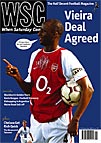 Ben Lyttleton looks at what's going on behind the glitz and glamour in Spain
Ben Lyttleton looks at what's going on behind the glitz and glamour in Spain
Spanish football looked in a healthy state when two billion fans tuned in to see David Beckham sign for Real Madrid last month. After all, the England captain had joined the biggest club in the world to play in the best league in the world. But Beckham’s arrival has coincided with a financial crisis in the Spanish game that Catalan daily El Periodico described as: “Total ruin, immense debt, crippling of the sector, zero credibility with the banks as well as ongoing investigations by tax officials.”
Beckham’s La Liga debut was threatened with a delay because of a row over television money. The league demanded €350 million (£260m) for the rights to the top two divisions from TV consortium Audovisual Sport, who offered €270m. Meanwhile, 12 of Spain’s biggest clubs have negotiated their own TV deals and left the other 30 fighting for their lives. Former Spain and Real Madrid coach Jose Antonio Camacho warned that the TV issue could be the tip of the iceberg. “The really serious thing is that this disagreement is bad for Spanish football and in the end the wounds will bleed all over the place,” he said.
The big clubs are already bleeding, among them five of last season’s top six sides: Deportivo La Coruña president Augusto Cesar Lendoiro is embroiled in a row with the Bank of Spain, who publicly recommended that lending institutions do not give clubs any more money; Celta Vigo paid only one of their players in full for last season’s efforts in which they qualified for the Champions League (that was Benni McCarthy, who had to be paid to ensure his move to Porto went through); Valencia’s financial situation has been precarious ever since Pedro Cortes stood down as president two years ago.
The staff working for new Barcelona president Joan Laporta have even put down their own money to help the club pay off debts after banks refused to support his term of office. That’s no surprise according to the wage levels that were published in the newspaper Vanguardia : the club’s total annual basic wage bill is €120m while nine players have a basic salary of at least €3m (that’s before appearance, win and goal bonuses). Striker Juan Roman Riquelme, who scored three goals last season, cost the club €194,000 per game.
Spanish league vice-president Toni Fidalgo admitted: “There is no doubt that this level of debt has been produced because every club has spent more than they’ve earned. And now we have to completely change our mentality in order to get out of this mess. We have the best league in the world but that has its costs.” Beckham’s new boss, Real president Florentino Pérez, celebrated his third anniversary recently and boasted: “For the first time in our history, the ordinary revenue is exceeding our outgoings.” But Eduardo Peña Abizanda, spokesman for Real supporters’ group Association for the Defence of Mad- rid Members, claimed Pérez was lying: “Under the presidency of Florentino Pérez, Real Madrid is a disaster at a financial level,” he said. “I suppose Florentino’s next trick will be to sell the Bernabéu and convert the club into a plc.”
Abizanda pointed to a study by Economic College of Madrid financial auditor Gerardo Ortega, who put the club’s current debt at €544.8m and praised the accountability committee of the Ministry of Economics and Tax, who have “begun to study the figures which Florentino Perez has made up in recent years”.
The Spanish government last moved to clean up football in 1985, when the debt was nine times less than it is now. Another newspaper has claimed the total debt in Spanish football is €2 billion. La Liga clubs still owe €240m in tax while their total outstanding debt to players is €48m. One senior director of a top-five La Liga club summed up the feeling among the country’s top brass: “We are all trying to extricate ourselves from this misery. In that project we need the help of everyone, including the government, the media and especially the TV companies to come out of this mess.”
From WSC 199 September 2003. What was happening this month